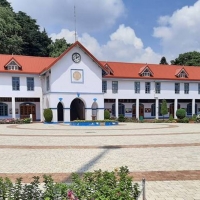Bishop Cotton School in Shimla, Himachal Pradesh Admission, Fees Structure

Where is Bishop Cotton School ?
Bishop Cotton School is Located in Shimla , Himachal Pradesh, India
Address of Bishop Cotton School, Shimla
Office (Tel) : (0177) 2620880,
How do I contact Bishop Cotton School?
Call at +91-177-2620880 to contact Bishop Cotton School
About Bishop Cotton School
The students at BCS enjoy a spacious and secure 35-acre campus set in the beautiful Shimla Hills. The clean air supports a healthy lifestyle where organized sport is played every day. A BCS education is holistic and values-driven. Old Cottonians enjoy a top class academic training, but they are also principled, resilient, entrepreneurial and leaders of others. Bishop Cotton, Shimla – a 21st century Indian School with a British Heritage and a global outlook.
Bishop Cotton School is located in the heart of the beautiful Shimla Hills, but within relatively easy reach of Chandigarh and Delhi. Strengthened by a proud history that goes back over one hundred fifty years we have our eyes firmly set on the challenges of the twenty first century.
To be educated at Bishop Cotton School is to enter the world beyond school with a range of qualities and skills. We hope to produce young men who are happy, resilient, self-motivated, confident and ready for any challenge that lies ahead. As a boarding community we aim to give the highest standard of pastoral care to every pupil who joins our family.
Small hamlets were recorded prior to 1815 when British forces took control of the area The climatic conditions attracted the British to establish the city in the dense forests of the Himalayas As the summer capital, Shimla hosted many important political meetings including the Simla Accord of 1914 and the Simla Conference of 1945 After independence, the state of Himachal Pradesh came into being in 1948 as a result of the integration of 28 princely states Even after independence, the city remained an important political centre, hosting the Simla Agreement of 1972.
After the reorganisation of the state of Himachal Pradesh, the existing Mahasu district was named Shimla Shimla is home to a number of buildings that are styled in the Tudorbethan and neo-Gothic architectures dating from the colonial era, as well as multiple temples and churches The colonial architecture and churches, the temples, and the natural environment of the city attracts tourists Attractions include the Viceregal Lodge, the Christ Church, the Jakhoo Temple, the Mall Road, the Ridge and Annadale The city centre's northern most point is Jakhoo and the southern most location is Annadale, and the easternmost point is Sanjauli and western point is Chotta Shimla.
The Kalka–Shimla Railway line built by the British, a UNESCO World Heritage Site, is also a major tourist attraction Owing to its steep terrain, Shimla hosts the mountain biking race MTB Himalaya, which started in 2005 and is regarded as the biggest event of its kind in South Asia Shimla also has the largest natural ice skating rink in South Asia Apart from being a tourism centre, the city is also an educational hub with a number of colleges and research institutions
The predominantly mountainous region comprising the present-day Himachal Pradesh has been inhabited since pre-historic times having witnessed multiple waves of human migration from other areas Through its history, the region was mostly ruled by local kingdoms some of which accepted the suzerainty of larger empires Prior to India's independence from the British, Himachal comprised the hilly regions of Punjab Province of British India After independence, many of the hilly territories were organized as the Chief Commissioner's province of Himachal Pradesh which later became a union territory In 1966, hilly areas of neighboring Punjab state were merged into Himachal and it was ultimately granted full statehood in 1971.
Himachal Pradesh is spread across valleys with many perennial rivers flowing through them Almost 90% of the state's population lives in rural areas Agriculture, horticulture, hydropower and tourism are important constituents of the state's economy The hilly state is almost universally electrified with 995% of the households having electricity as of 2016.
The state was declared India's second open-defecation-free state in 2016 According to a survey of CMS – India Corruption Study 2017, Himachal Pradesh is India's least corrupt state